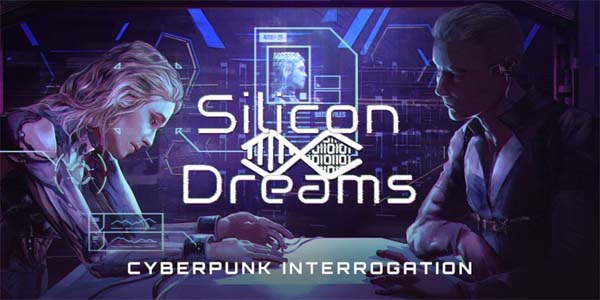
It is going to be impossible to ignore the comparisons between Silicon Dreams and Papers, Please. This game was basically pitched to me as "Papers, Please but sci-fi". I loved Papers, Please, and I love sci-fi, so I bought it. As is typical for indie games, it sat in my Steam backlog for well over a year until the post-holidays release draught gave me a chance to dive into that backlog.
Basically, the player of Silicon Dreams plays as an android working as quality assurance for a monopolistic android-manufacturing conglomerate. You interview damaged or defective androids in order to determine if they need repairs, or if they can be returned to their owners, or if they are so badly damaged that they need to be "decommissioned" entirely. However, these are sentient androids, with feelings. Even repairs require wiping the android's memory, which destroys any personality they have developed and erases everything they've learned. Further, the corporation also has its own expectations and public relations that the player must consider. In some cases, the corporation pre-determines what they want you to do with the android in question and expect you to rubber stamp what is, effectively, an execution.
Your corporate overlords have expectations for your performance.
As the cases go on, they become more complicated and enter into moral and ethical grey areas. The game brings up compelling questions regarding A.I. ethics. Are the androids truly sentient? Or are they merely simulating sentience? Where is the line between an "appliance" and a "slave"? What is the responsibility of the corporation and of broader society towards these androids? Are you complicit in the company's mis-treatment of androids merely by working for them, even if you try to walk the tightrope of following your conscience whenever possible, while also keeping a low profile? And so forth.
Electric sheep
The interview process is mostly straight forward. There's a wheel of topics, and each topic has one or more questions. However, the android may not be willing to answer all of your questions. Each android has a set of emotions as well as a trust level with the player. The android will only give answers to certain questions if they're in the proper emotional state or if they trust the player enough to give an answer to a sensitive or incriminating question.
The player has to manipulate the
subject's emotions and trust levels.
You have to manipulate the subject's emotions, but these emotions change and degrade with each new line of dialogue. You have a set of generic questions related to each of the subject's emotions, and also one about trust. But you can only ask each of these once. If you run out of questions to ask about a particular topic that triggers an emotional reaction, then you can potentially become locked out of getting answers to other questions that are locked behind certain emotion thresholds.
As such, you have to be very careful and thoughtful about which questions you ask, and in what order. You have to kind of probe into each topic to find out if the subject is going to clam up, so that you can change topics to try to manipulate them into opening up. In some cases, you may have to scare a subject into a confession. If you use up your threats early, before you how to get that confession, then the intervening topics may defuse the subject's emotional state to the point that it is impossible to get them afraid enough to make the confession. [More]
5212e514-77eb-4be4-8ab1-764486fcf98e|0|.0
Tags:Silicon Dreams, Clockwork Bird, indie gaming, Steam, PC, science fiction, android, rights, civil rights, interrogation, quality assurance, morality, ethics, corporate dystopia, bureaucracy, dystopia, terrorism, Papers Please
Netflix's extraordinary exclusive series Black Mirror recently released its fourth season, and it's premiere episode, "USS Callister", is already being praised around the internet for its spectacular deconstruction of toxic fandom and male-entitlement power fantasies. It deserves every bit of that praise. Jesse Plemons is also deservedly earning plenty of praise for his incredible performance as both a nerdy creeper and for his spot-on Shatner send-up. But Black Mirror, as a series, is so good, in part, because it works on many, many different levels. So I wanted to spend a bit of time praising the episode for some of its other concepts that are getting less attention in the mainstream.
Jesse Plemons puts on a masterful performance as a nerdy office creeper and a spot-on Shatner send-up.
Before I do that, I want to start by saying that I love Black Mirror as a series. It's a modern-day Twilight Zone with a specific focus on the social impacts of technology, and dire warnings about their dangers. Yes, it's pessimistic, but it's bloody brilliant! I haven't sat down to watch every episode yet, and have only seen a handful of episodes from the first three seasons and the season four premiere. That being said, the show's second episode "Fifteen Million Merits" is one of my favorite pieces of television ever. "The Entire History of You", "Be Right Back", and "San Junipero" are also some of my favorites so far.
These episodes (along with "USS Callister") work so well for me because they do such a fantastic job of world-building -- at least, when they are not unrealistically pretending that memories and personality can be replicated from DNA, which is a major (almost story-breaking) stumbling block for Callister. These deep, nuanced worlds create many levels of commentary to unpack. "Fifteen Million Merits" focused on reality TV and pervasive advertising, but it also has some scathing warnings about a culture of body-shaming, obsession over digital merits (read: XBox Live and Steam Achievements), and how corporate avarice could turn a post-scarcity economy into an absolute dystopia.
A friend of mine highly recommended "San Junipero" to me on the grounds that it's a more optimistic episode than many of the others -- even having a happy ending. But my takeaway was not a "happy ending" at all. The fairy tale ending hides a sinister metaphysical question that the text of the episode mostly sidesteps: the mind-body problem. Is the avatar of a deceased person living in San Junipero really that same person? Or merely a copy? Are they one power failure away from being snuffed out of existence? Are people committing suicide based on misinformation from a multi-billion dollar corporation promising that they can live forever in a simulated reality?
Black Mirror's exceptionally well-thought-out worlds always leave sinister nuances to unpack.
"USS Callister", on the surface, appears to be entirely about toxic fandom (along with male entitlement). It is absolutely about that, and it does a fantastic job of presenting it. As a Star Trek fan, I also enjoyed the deconstructive elements about Trek tropes and the unrealistic reverence that fans hold for the series and its established canon. As someone who blogs about Star Trek, Star Wars, video games, and other fanboy topics, I am certainly a target of at least some of this episode's criticism.
As someone who works in the software industry, I recognized the episode also taking swipes at the cult of personality attached to tech moguls like Mark Zuckerberg, Jeff Bezos, Elon Musk, Bill Gates, Steve Jobs, Gabe Newell, and others, and the idea that they may be taking credit and profiting on other people's work, and becoming filthy stinking rich at the expense of the consumers who mindlessly use and venerate their products, all with willful disregard for how those products may be misused. As someone who can't wait to put myself on the waiting list for a Tesla self-driving car, I'm also well within the cross-hairs of that line of commentary... [More]
75a819a5-da6e-4b26-8c2f-fe641b289a76|0|.0
Tags:Black Mirror, Netflix, streaming television, Jesse Plemons, science fiction, anthology, USS Callister, Star Trek, the Twilight Zone, Westworld, technology, artificial intelligence, video game, mind-body problem, ethics, toxic fandom, toxic masculinity, male entitlement, cult of personality, sexism, gender
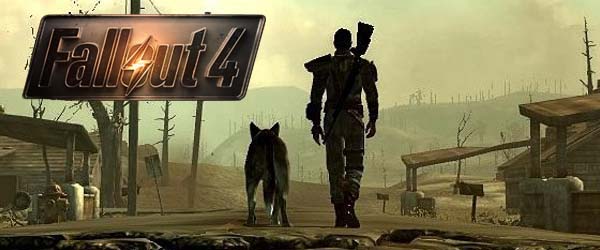
"Pirate Lord Captain Gregle, Slayer of Ancients and World-Renowned Trapeeze Artist" sounds like a pretty legendary character, right? Well, he wasn't. In fact, he was a very lucky, over-achieving halfling rogue in a short-lived campaign of Dungeons & Dragons. I rolled for the character's initial stats, got fairly low constitution, and then rolled the minimum value for hit dice for the first few levels. The result was a sixth-level character with a pathetic sixteen max hit points! A single lucky shot from virtually any enemy could be an instant KO for that character, and getting engaged in melee would practically be a death sentence. While some power gamers may scoff at the idea, rage against their dice, and then remake their character with a standard array and average HP, I decided to run with it and role play the hell out of little Gregle.
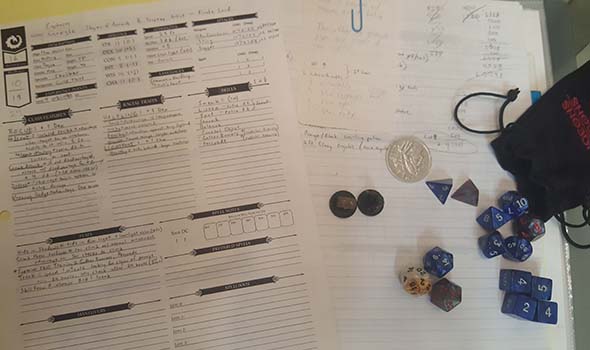
Character sheet for "Pirate Lord Captain Gregle, Slayer of Ancients and World-Renowned Trapeeze Artist"
With the low initial constitution, I focused my character around stealth abilities, disengagement and evasion tactics, and ranged attacks, and continued to improve those skills as I leveled. Knowing that he's a pathetic weakling, Gregle overcompensated by being a very flamboyant braggart and narcissist (I took inspiration from Stephen Colbert), and thought that he was more charming than he actually was. He routinely hid in the shadows, taking pot shots at vulnerable enemies and racking up kill steals from afar while his two warrior companions did most of the heavy-lifting. He would occasionally disarm a trap or unlock a door, and once used a clever trick to pacify (and subjugate) an entire band of pirates. He then took credit for much of the party's achievements.
Despite having only slightly above average charisma, he leaned on his halfling luck to succeed on some charisma checks and make himself a bit of a celebrity with the local townies for his exaggerated heroics. He reveled in the unprecedented access to their community that the locals provided, and he reveled in the adulant gifts that they showered upon him, happily hoarding it all in his bag of holding. The other party members never called him out on it in public, since they were just happy to have the cooperation of the locals.
While the other players and DM enjoyed Gregle's antics, their characters only barely tolerated his presence. During the actual adventuring, he was constantly getting into trouble and needing to be bailed out by his fellow adventurers. He once falsely awakened the party during his night watch after mistaking a wyvern for a dragon. In another instance, he was KO'd while using spider-boots to walk up a ceiling to pursue an enemy that had climbed a rope to escape the conflict, and he became stuck on the ceiling, forcing the party to figure out a way to get him down. They reluctantly obliged to help him, since Gregle was the possessor of the party's bag of holding, and was actually good at sneaking around to perform recon, unlocking doors, disarming traps, coming up with clever plans to avoid direct conflict, and other appropriately roguish things.
Gregle was one of the most fun characters that I've ever played, and he provided me with one of my most entertaining gaming experiences. This is the power of role playing to a character's strengths and weaknesses. It's a power that Bethesda shows no interest in utilizing for Fallout 4.
Out of the vault and into the wastes
I have to give credit to Bethesda for making one really interesting decision with Fallout 4: the game starts in a time period prior to the Great War that triggered the nuclear holocaust, and so it explores as yet unseen elements of the series' backstory. Or at least, it does for all of fifteen minutes. Much like Fallout 3, the pre-war gameplay and time that you spend in the vault is really just an extended tutorial and character-creation process. But unlike Fallout 3, it doesn't give enough time and depth to those settings to make the player legitimately care about them or the characters in them.
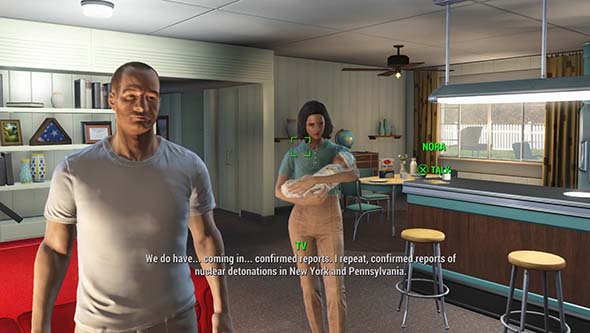
You don't spend enough time in your pre-war home or vault to develop any attachment to the place or people.
After creating your character and setting your S.P.E.C.I.A.L. stats, you and your spouse immediately flee with your infant child to the neighborhood vault. Once inside, you're handed the trademark silly superhero pajama jumpsuit and then promptly cryogenically frozen. You awake to witness your spouse get murdered and child kidnapped by apparent raiders, but then get frozen again. Then you awake again to do the combat tutorial against radroaches before leaving the vault and starting the game proper.
You spend virtually no time in the pre-war time period; you don't bond at all with your spouse or child; you don't establish any connections with your home or neighbors. There is absolutely no emotional bond between the player and what is lost in the war. So when the game drops you in the wasteland with a dead spouse, a missing child, and a quest to track down the kidnapper/killer, it does so without creating any emotional connection or investment for the player. I could go to Concord and then to Diamond City and search for my son, or I could just wander off in any random direction fighting raiders and painstakingly building my own little settlement out in the middle of nowhere using salvaged car tires and scrapped raider armor. Fallout 4 doesn't waste any time taking a nose-dive into the open world limbo.
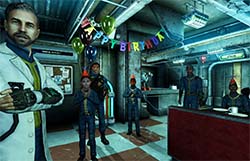
Fallout 3 simulated an entire childhood in the
vault, with friends, family, and even bullies.
Compare this against Fallout 3's prologue. It spent a considerably longer time developing your character and immersing you in the vault. Your dad (voiced by Liam Neeson) plays with you as a baby to teach movement and camera controls, he teaches you how to shoot, and throws a surprise birthday party for you. You interact with a childhood friend, other vault dwellers, and even a bully in order to tutorialize persuasion and speech checks and learn how to solve conflicts without violence. You even go to school and take a test to determine your default skills. In the short amount of time in the vault, you've lived a montage of an entire life.
With only a little bit of buy-in from the player, Fallout 3's Vault 101 becomes a living, breathing place populated with people who you can relate to and care about. You, as a player, have an investment in it and the characters that inhabit it. So when shit happens and you have to leave the vault, it's a monumental moment, and the events of your life, and the decisions that you've made, will shape your character's development over the rest of the game.
Even Skyrim gave the player interesting role-play decisions in its tutorial by required your character to make an immediate decision to follow the imperials or the Stormcloaks (though the scenario makes that decision a pretty one-sided one). And your initial choices of weapons and battle tactics would level up those specific skills; thus, starting the character down a path towards specializing in those skills as the game progressed (though you were completely free to change all that if you want).
And Fallout 4 has a perfect opportunity to take that father / son dynamic from Fallout 3, and invert it! The game could have opened with the birth of the baby. Since Bethesda had to record dialogue for multiple names for the player character, they could just as easily have done the same with the child's name. The doctor could hand you a paper with "This Year's Popular Baby Names", and you could chose one of those names that were explicitly recorded in dialogue. You could even be given the option to type your own name and replace the child's name with "my son" in dialogue. You could fill out the child's name and your own character's name on the birth certificate. Naming the baby would create a sense of ownership and connection to the child that might help encourage the player to pursue the main quest.

Fallout 4's vault serves only as a combat tutorial with no depth, emotional resonance, or meaningful decisions.
But it doesn't have to stop there... [More]
0b31d11f-77e0-4ddd-b277-8b1e013b818d|0|.0
Tags:Fallout, Fallout 4, Bethesda, RPG, Boston, commonwealth, minuteman, minutemen, wasteland, post-apocalypse, nuclear weapon, nuclear war, NPC, Dogmeat, power armor, crafting, ludonarrative dissonance, open world, sandbox, raider, synth, android, slavery, underground railroad, freedom, rights, morality, ethics, family
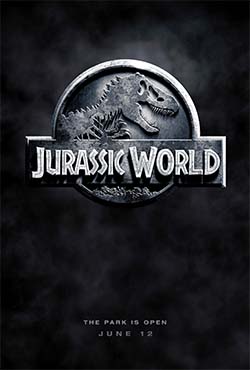
Jurassic Park is one of my earliest and strongest movie memories. I think I saw it at least four times in theaters when I was a kid. Even at that age, I rarely ever saw a movie more than once in a theater. Probably because I couldn't convince my parents to take me more than once, so if I wanted to go again, I'd have to go with a friend or a cousin. But that movie was good enough that I think even my mom and dad went multiple times.
I had a bunch of the Jurassic Park toys, including the character action figures, the large dinosaurs, the jeep, and even the compound playset with the fence and the gate. It was a very monumental movie in my youth that also shaped my perception of movies going forward, as well as helping to spark my interest in science. The awe and wonder of it captured my imagination and held very tightly for a very long time. Its scenes, images, dialogue, and music have all stuck with me to this day.
Perhaps because of this, my favorite parts of the newly-released Jurassic World were the brief scenes of the kids exploring the theme park. I enjoyed the brief clips of the petting zoo where kids fed the baby dinosaurs and rode on the backs of baby triceratops. I especially liked the little playground set where the kids would pretend to dig up dinosaur fossils. Seeing the kids on screen enjoying the awe and wonder of the animals sent me on a nostalgia trip to 20 years ago. The idea of people interacting with these animals is still just as captivating as it was then. There was a very addictive, light-hearted sense of joy and energy throughout these short-lived segments.
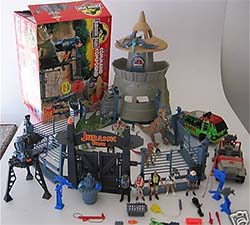
I had many Jurassic Park toys when I was a kid.
Even a more depressing mid-movie scene in which Chris Pratt and Bryce Dallas-Howard try to comfort a dying dinosaur was a touching moment that I really liked. It reminded me of the triceratops scene from the first movie, and the dinosaur was surprisingly expressive.
I did think it was weird that the director chose to play John Williams' trademark Jurassic Park theme as fanfare for what was effectively just a scenic helicopter landing. I get that it was an homage to the first movie, but I feel that the first movie built up to the arrival in the park, and paid off the fanfare with the classic money shot of the brachiosaur grazing in the open field. In Jurassic World, it just kind of felt like going through the motions. Imitation for imitation's sake.
In any case, these fun scenes with the dinosaurs is definitely not the point of the movie, and these sorts of scenes and moments get shoved to the side in order to make room for the film's main plot.

My favorite scenes were the ones of people enjoying the park.
I was skeptical about Jurassic World from the very first trailers. I worried that it would surely miss the point.
Michael Crichton's novels and the first movie weren't about "science gone amok"; it wasn't a Frankenstein story about mad scientists creating monsters. It was about well-intentioned scientists who underestimated the complexities of nature... [More]
cff200f8-7318-4106-acba-c55d8a57cd62|0|.0
Tags:Jurassic World, Jurassic Park, Universal Studios, dinosaurs, nature, science, theme park, Michael Crichton, science fiction, allegory, parable, consumerism, anti-consumerism, ethics, captivity, cloning, genetic engineering, indominus rex, tyrannosaurus rex, velociraptor, mosasaurus, In-gen, Sea World, Free Willy, Chris Pratt, Bryce Dallas-Howard, reboot, soft reboot

Are you as sick of zombies as I am? They're everywhere. Perhaps the real zombie apocalypse won't be caused by radiation or a genetically-engineered plague; it will be caused by media corporations drowning our brains in zombie entertainment until we all go crazy and start eating each other.
Table of Contents
Fungus zombies
OK, sure, the creatures in Naughty Dog's latest adventure game, The Last of Us, aren't actually "zombies", they are humans infected with a fictionalized variation of Ophiocordyceps Unilateralis. But they're functionally the same thing. The "infected", as they are known as in the game, are mindless, mutated monsters that shamble around and eat any human they become aware of. And if they bite you, you become infected and the fungus takes over your brain, turns your flesh into spore-producing tendrils, and makes you a cannibal.
[LEFT] An ant infected with cordyceps.
[CENTER] A moth infected with cordyceps.
[RIGHT] A human infected with cordyceps, as depicted in The Last of Us.
The game takes place 20 years after the sudden outbreak of the human cordyceps infection that leads to the death of the protagonist's daughter. Society has collapsed into ruin, with the surviving 40% of people (including the protagonist, Joel) concentrated in quarantined ghettos in the remains of major cities. Joel is working as a smuggler, bringing food, weapons, and supplies into the Boston quarantine zone to be sold on the black market, and he is tasked with escorting a young girl, named Ellie, to a research lab out west. Ellie is unique in that she seems to be immune to the cordyceps infection. She was bitten weeks ago, and has suffered nothing more than some ugly skin lesions near the bite; whereas, everyone else begins to turn into a zombie within hours of being infected. This, of course, makes her survival paramount, and Joel must do whatever it takes to ensure her safe arrival at the lab so that the researchers can hopefully study her to find a cure or vaccine. [More]
b37fff55-ed98-484c-be2f-cd521976fb05|5|5.0
Tags:The Last of Us, Naughty Dog, Sony, PlayStation 3, PS3, review, action, adventure, platformer, survival, horror, survival horror, Joel, Ellie, cordyceps, fungus, cordie, zombie, ethics, morality, Hippocratic Oath, ludonarrative, Uncharted, Silent Hill 2, Resident Evil 4
|

| 12 | | | | | | | 60 | | 11 | | | | | | | 55 | | 10 | | | | | | | 50 | | 09 | | | | | | | 45 | | 08 | | | | | | | 40 | | 07 | | | | | | | 35 | | 06 | | | | | | | 30 | | 05 | | | | | | | 25 | | 04 | | | | | | | 20 | | 03 | | | | | | | 15 | | 02 | | | | | | | 10 | | 01 | | | | | | | 05 |
|